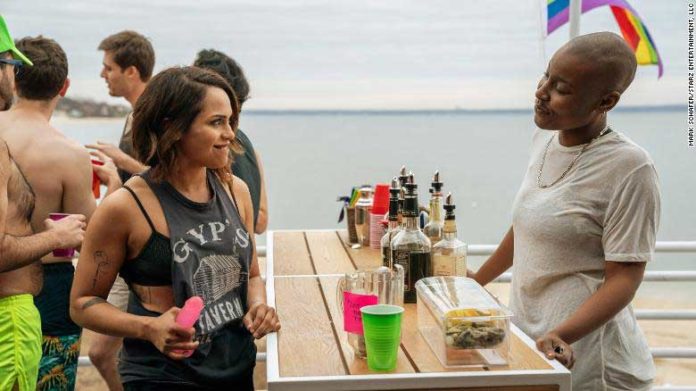Opioids were the pandemic before the coronavirus — all but forgotten now. That crisis hasn’t gone away, it’s just out of sight, again. But in STARZ’ new series, “Hightown,” small-town village life, unemployment and drug addiction provide a triptych of misery that can — and does — end in death.
A beach noir that gets darker with each successive episode, “Hightown,” is set in the gay mecca of Provincetown. Like most towns that rely largely on a tourist trade for bread and butter, Provincetown is divided between the mostly working-class townies and the tourists — providing ample drama and a whole lot of queerness.
In the midst of this series of conflicts is Jackie Quiñones (Monica Raymund), a hard-partying Latinx butch on the prowl. She’s a National Marine Fisheries Service Agent — or was until her license got suspended for a DUI. Jackie seduces women tourists. Many women tourists. With terrible pick-up lines. And slights to men and their penises.
There’s a lot of lusty lesbian sex right up front, and there are other bawdy queer scenes. But where “Hightown” diverges from the typical P-town tale, is that the wealthy white gay men who take over the town every summer are the ones on the margins of this story: it’s the locals, like Jackie, who are the focal point.
Hard-partying Jackie does cocaine on the street and is always a little drunk. She is a quick-to-anger woman on the edge with no real direction. Then she stumbles drunkenly onto the beach on Cape Cod Bay, where she finds the body of a young woman who’s been dumped there — a woman experiencing addiction.
From there forward, Jackie is on a mission: get sober and solve the murder she is convinced no one else seems to care about and which could also prove her salvation. But to get there, she has to team up with a detective. Ray (James Badge Dale) knew the dead woman, and he has his own issues to deal with. Together they must — on divergent paths to redemption — solve that crime and others.
Raymund (“Chicago Fire”), an out bisexual actress with a huge fan base among queer women, told TV Guide, “Any time I get to play a member of my community, I jump on it.” She is stellar as Jackie — fully realized and in the starring role she has long deserved.
There are also really solid performances by secondary characters. Riley Voelkel is exceptionally good as Renee, a stripper involved in the case which is married to a minor drug lord, imprisoned gang leader, Frankie (Amaury Nolasco), who, like Ray, is using Renee.
“Hightown” has a lot of power — the realness of the addiction that runs through the town is multi-faceted and hyper-realistic. And some of the secondary storylines are heartbreaking without being maudlin.
The show is beautifully shot and incredibly vivid. As Jackie finds herself at the epicenter of the Cape’s grim epidemic, she has to take a hard look at her life and the lives of the people — especially the — around her. The 12-step scenes will resonate for anyone who’s been in one.
“Hightown” was created and written by Rebecca Cutter (“Gotham”). In January at the Television Critics Association panel, Cutter said she wanted to tell a “tough guy” story with “ball-breaking language” through a women’s lens. She said as a person in recovery, she also wanted to tell an addiction story — and the verisimilitude is definitely there. The series is executive produced by Cutter, Gary Lennon (“Power,” “Euphoria”) and the king of police procedurals, Jerry Bruckheimer.
Out lesbian cinematographer Rachel Morrison directs the series. In 2017, Morrison became the first woman ever nominated for an Academy Award for Best Cinematography in the Academy’s then 90-year history for her work on out lesbian director Dee Rees’ film “Mudbound.” (It’s available on YouTube, as is Rees’ film “Bessie,” about Bessie Smith, starring Queen Latifah.)
“Hightown” is on Sundays at 8 p.m. on STARZ.
